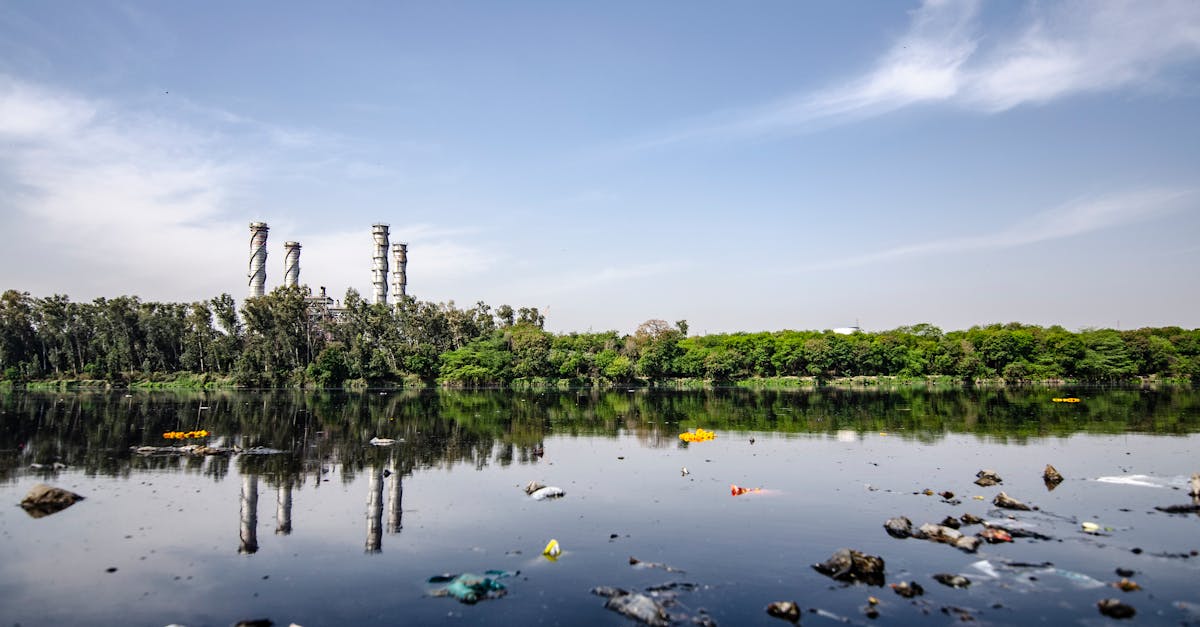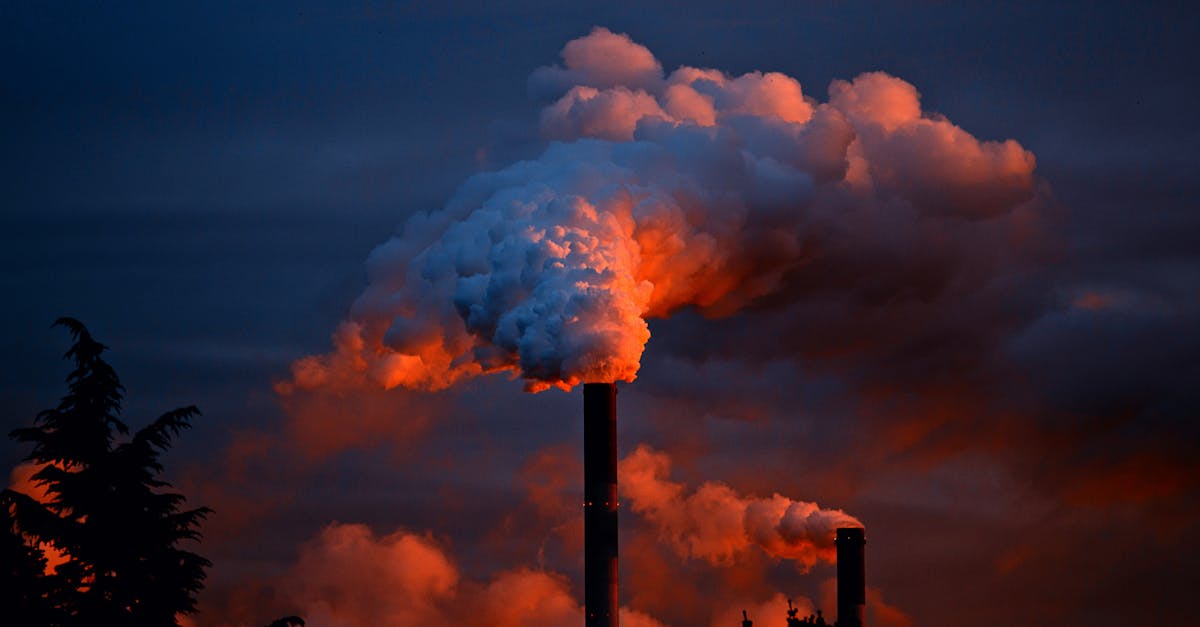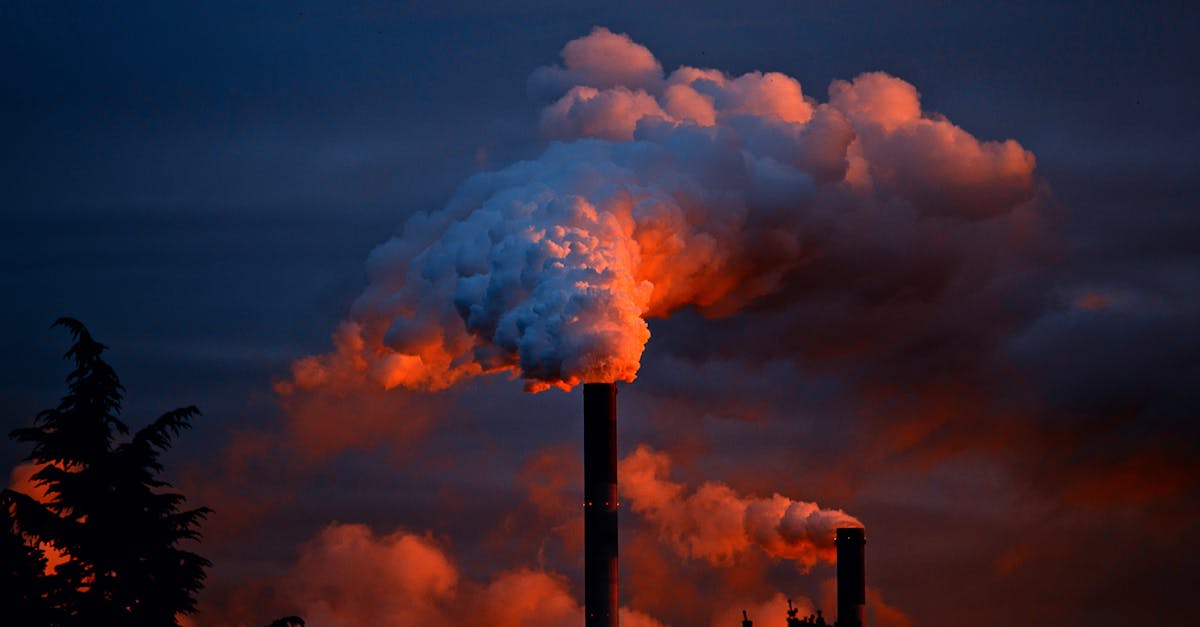Unveiling the Underlying Culprits: A Detailed Examination of 2022’s Most Polluting Industries

Exploring the pressing issue of pollution in 2022, this article delves into an in-depth analysis of the most polluting industries from an eco-expert perspective. With a focus on environmental sustainability, this comprehensive study identifies the key contributors to pollution and aims to present feasible solutions for a cleaner future. From energy production and transportation to manufacturing and waste management, the article aims to shine a light on the critical need for collective action and responsible environmental policy. This exploration is not only a call to acknowledge the severity of pollution but also an invitation to consider the potential for tangible change through innovative strategies and sustainable alternatives.
1. Introduction: Understanding Pollution in 2022
Thank you for reading this post, don't forget to subscribe!
Welcome to the comprehensive exploration of pollution in 2022, offering an insightful overview of its current state and the profound impact it has on our environment. As we stand at the precipice of change, it’s crucial to understand the multifaceted nature of pollution, ranging from toxic emissions to widespread ecological degradation. In 2022, our world faces unprecedented challenges due to pollution, signifying an urgent need for collective action and innovative solutions. This article aims to shed light on the severity of this issue while maintaining a friendly and approachable tone, providing a gateway into the complex world of environmental sustainability. By delving into the causes and effects of pollution, we hope to empower readers with knowledge and inspire meaningful change in our approach to preserving the planet.
The Global Environment Report
Dive into the latest environmental reports to uncover the deep-seated impact of pollution in 2022. As we analyze the findings, it becomes evident that the global environment report echoes a resounding call for immediate attention to the severity of pollution across various industries. Through a friendly and accessible lens, this exploration aims to unravel the complexities of these reports, offering insights that everyone can readily comprehend. These reports serve as crucial navigational tools, providing a roadmap for understanding the scale of pollution and the urgency of sustainable practices. The goal is not only to inform but also to inspire action, fostering a sense of camaraderie in our collective responsibility to protect our planet.
Importance of Industry Analysis
Understanding the significance of industry analysis plays a pivotal role in shaping our approach to environmental sustainability. By delving into the impact of various industries on our planet, we gain essential insights that allow for informed decision-making and impactful change. This friendly exploration aims to demystify the importance of industry analysis, highlighting the role it plays in identifying the primary sources of pollution and their subsequent environmental effects. Through a lens of shared responsibility, we can collectively work towards fostering a healthier and more sustainable world. This analysis is not only about highlighting problems but also about illuminating pathways toward solutions, emphasizing the power of knowledge and collaboration in safeguarding our environment.
2. Ranking the Top Polluting Industries

Embarking on a journey to uncover the top polluting industries of 2022, we aim to unravel the intricate web of environmental impact woven by these sectors. Through a friendly and approachable perspective, this detailed examination seeks to demystify the factors contributing to the highest levels of pollution. From energy production and consumption to transportation, manufacturing, agriculture, and waste management, this exploration will shed light on the environmental footprint of each industry. By engaging in this discussion, we empower ourselves with a deeper understanding of the challenges we face and the opportunities for sustainable change. Through this lens of awareness, we sow the seeds for collective action and responsible industry practices that can pave the way for a cleaner, greener future.
1. Energy Production and Consumption
When we examine the impact of energy production and consumption on pollution, we uncover a complex web of interconnected factors that affect our environment. Through an amicable lens, this exploration aims to shed light on the repercussions of our energy needs, including emissions and waste. As the demand for energy continues to rise, it’s crucial to understand the environmental cost associated with its production and utilization. This examination delves into the multifaceted challenges posed by traditional energy sources, while also exploring the potential for sustainable, eco-friendly alternatives. By fostering a comprehensive understanding of the link between energy and pollution, we can collectively work towards shaping a greener, more sustainable energy landscape for the future.
2. Transportation Sector
As we delve into the environmental impact of transportation, encompassing air, road, and sea transport, we encounter a diverse array of challenges and opportunities. From the emissions of air travel to the infrastructure and fuel consumption of road transportation, each mode significantly contributes to our environmental footprint. This friendly exploration aims to unpack the complexities of transportation and its ecological consequences, offering insights into the importance of embracing sustainable practices and innovation within the industry. By examining the environmental impact of transportation, we open the door to collaborative efforts and responsible decision-making, laying the groundwork for a more sustainable and eco-conscious approach to mobility.
3. Manufacturing and Chemical Industries
When we explore the pollution generated by manufacturing processes and chemical production, we unravel a critical aspect of environmental impact that demands our attention. With a friendly approach, this exploration seeks to shed light on the intricate web of pollution created by manufacturing and chemical industries. From emissions to waste byproducts, these sectors play a significant role in shaping our environmental landscape. By understanding these challenges, we open the gateway to embracing sustainable practices and innovative solutions within these industries, thereby paving the way for a cleaner, greener future. This analysis serves as a reminder of the potential for meaningful change and sustainable advancements in these vital sectors, enhancing our collective commitment to environmental well-being.
4. Agriculture and Agribusiness
As we investigate the contribution of agriculture, farming practices, and agribusiness to environmental pollution, it becomes clear that these areas hold a significant influence on our ecological well-being. Through a friendly lens, this exploration aims to illuminate the ways in which agricultural practices and agribusiness impact our environment. From pesticide use to livestock emissions and deforestation, the agricultural sector significantly affects our ecosystems. By understanding these dynamics, we open the door to embracing sustainable farming practices, responsible land management, and innovative approaches in agribusiness. This investigation serves as a catalyst for promoting eco-friendly agricultural methods and fostering a renewed sense of environmental stewardship within the industry, paving the way for a more harmonious relationship between agriculture and nature.
5. Waste Management and Landfills
When we shine a light on waste management and landfills, we uncover a critical aspect of environmental impact that often goes unnoticed. Through a friendly and approachable perspective, this exploration aims to highlight the ways in which waste management and landfills contribute to environmental pollution. From landfill emissions to the challenges of sustainable disposal methods, these aspects significantly shape our ecological footprint. By understanding these challenges, we open the door to embracing innovative waste management techniques, sustainable disposal practices, and responsible recycling initiatives. This examination serves as an invitation to promote eco-friendly waste management strategies, fostering a renewed sense of environmental stewardship within the industry and highlighting the potential for a cleaner, healthier environment for communities globally.
3. Eco Expert Insights and Recommendations
Incorporating eco expert insights and recommendations into the conversation surrounding pollution and sustainable practices brings a wealth of knowledge and experience to the forefront. These insights provide a roadmap for understanding the complexities of environmental challenges and offer practical, actionable recommendations for addressing pollution. Through a friendly and inclusive lens, this exploration aims to showcase the wisdom and innovative solutions proposed by environmental experts. By highlighting their valuable perspectives, we not only gain a deeper understanding of the issues at hand but also gain inspiration and guidance in pursuing sustainable initiatives. This collaboration between industry experts and the broader community lays the foundation for collective action and transformative change, emphasizing the power of knowledge and collaboration in safeguarding our environment.
Challenges Faced by Eco Experts
Navigating the challenges faced by eco experts reveals the intricate landscape of combating pollution and fostering sustainable initiatives. With a friendly and empathetic approach, this exploration aims to shed light on the difficulties environmental experts encounter in their mission. From policy obstacles to technological barriers and public awareness, these challenges underscore the complex nature of environmental conservation. By understanding and acknowledging these hurdles, we open the door to meaningful conversations and collective efforts to overcome them. Through collaboration and support, we can pave the way for innovative solutions, empowering eco experts and the community alike to collectively pursue a more sustainable future.
Recommended Strategies and Solutions
Exploring the expert-recommended strategies and solutions serves as a beacon of hope in the battle against pollution. Through a friendly and accessible lens, this examination delves into the wealth of approaches put forth by environmental experts to mitigate pollution across industries. From embracing renewable energy sources and advancing green technologies to optimizing manufacturing processes and promoting sustainable farming practices, these solutions offer a roadmap toward a cleaner, more sustainable future. By spotlighting these expert-recommended approaches, we not only gain valuable insights but also invite a communal spirit of shared responsibility and action, aligning ourselves with the pursuit of transformative change.
4. Impact on Global Climate Change

Delving into the impact of industrial pollution on global climate change unveils a critical interconnection that shapes the world we live in. Through a friendly and approachable perspective, this discussion aims to illuminate the intricate relationship between industrial pollution and its reverberating effects on global climate change. The emissions and byproducts stemming from industrial activities contribute significantly to the escalation of greenhouse gases, reinforcing the urgency of adopting eco-friendly practices and policies. By understanding this interplay, we not only gain insight into the challenges we face but also open the door to collaborative efforts, policy discussions, and technological innovations aimed at mitigating these impacts. This exploration serves as a reminder of the profound influence of industrial practices on the environment and our collective responsibility in fostering a sustainable future.
Carbon Emissions and Greenhouse Gases
When explaining how industrial pollution contributes to the rise in greenhouse gas emissions and subsequent climate effects, it’s essential to adopt a friendly and approachable tone. Industrial activities, through their emissions and waste products, significantly contribute to the increase in greenhouse gas concentrations, notably carbon dioxide and methane, in the atmosphere. These gases trap heat, leading to a gradual rise in global temperatures and influencing climate patterns worldwide. By understanding this linkage, we can collectively work towards embracing eco-friendly practices and advocating for sustainable industrial approaches, thereby mitigating the impact on our climate. This examination underscores the need for concerted efforts, policy changes, and technological advancements aimed at reducing emissions, fostering a healthier, more sustainable environment for future generations.
Environmental Policy and Legislation
Analyzing the role of policy and regulations in controlling industrial pollution to combat climate change reveals the vital influence of governance on environmental sustainability. Friendly and approachable, this discussion emphasizes the crucial role of environmental policies and legislation in curbing industrial pollution and its impact on climate change. Strong regulations and proactive policies play a pivotal role in shaping industry practices, promoting sustainable technologies, and mitigating harmful emissions. By understanding the integral relationship between policy and environmental well-being, we invite a collective focus on driving positive change through legislative measures and advocating for eco-friendly industrial standards. This examination underscores the need for ongoing dialogue, public engagement, and the continuous improvement of environmental regulations to safeguard our planet for current and future generations.
5. Potential for Sustainable Alternatives
Exploring sustainable alternatives and innovations presents an optimistic approach to reducing pollution across industries. By embracing a friendly and open perspective, this exploration delves into the vast potential for sustainable alternatives, offering a beacon of hope for a cleaner, more environmentally friendly future. From renewable energy sources to eco-friendly manufacturing practices and innovative waste management techniques, there exists a wealth of sustainable alternatives that can significantly mitigate industrial pollution. By understanding and promoting these alternatives, we empower industries and communities to enact positive change and adopt practices that are gentle on the environment. This examination invites us to champion eco-friendly innovation and embrace sustainable practices, cultivating a shared commitment to a healthier planet for generations to come.
Renewable Energy Solutions
Renewable energy solutions offer a promising avenue for reducing pollution from energy production, fostering a cleaner and more sustainable future. By highlighting the potential of renewable energy sources, this discussion sheds light on the pivotal role they play in mitigating the environmental impact of traditional energy production. Embracing solar, wind, hydro, and other renewable energy sources not only significantly reduces harmful emissions but also promotes energy independence and resilience. Through friendly and approachable dialogue, this exploration underscores the transformative power of renewable energy, inviting us to advocate for and embrace these solutions as integral components of a cleaner, more eco-conscious energy landscape.
Green Technologies and Innovations
Exploring green technologies and innovations provides a fascinating glimpse into the latest advancements aimed at minimizing pollution from transportation and manufacturing. Through a friendly and engaging lens, this discussion delves into cutting-edge developments that hold the promise of significantly reducing environmental impact. From electric vehicles and hydrogen-powered transport to sustainable manufacturing processes and carbon capture technologies, these innovations stand as beacons of hope for a greener, more sustainable future. By uncovering and promoting these technologies, we can collectively champion a shift towards environmentally friendly practices, fostering a healthier planet for generations to come.
6. Conclusion: Ensuring a Cleaner Future
In conclusion, it’s vital to recognize that ensuring a cleaner future requires the collective efforts of individuals, industries, and governments. By emphasizing the importance of collaboration, we pave the way for a sustainable and pollution-free future. This engaging and friendly approach to change underscores the need for shared responsibility, promoting eco-friendly practices, and advocating for policy changes aimed at mitigating pollution. It’s a call to action for communities, businesses, and policymakers to work hand-in-hand towards creating a healthier, more sustainable world for all. With an eye to the future, we can forge a path that champions environmental stewardship, technological innovation, and a global commitment to combatting pollution. By taking collective action and pursuing sustainable practices, we can ensure a future that is not only cleaner but also nurturing for the entire planet.
Collective Responsibility
Stressing the need for collective action and responsibility is fundamental in combating industrial pollution. Adopting a friendly and accessible tone, this discussion underscores the importance of shared accountability in addressing environmental challenges. By promoting collective responsibility, we lay the groundwork for a proactive and sustainable approach to industry practices and policies. This inclusive mindset emphasizes that all stakeholders have a role to play in combatting pollution, from individuals making eco-conscious choices to industries adopting sustainable technologies and governments implementing stringent regulations. It’s a warm invitation to join hands in creating a cleaner, healthier planet for present and future generations.
Hope for Change
Highlighting success stories and the potential for positive change through environmental activism and innovation sheds light on the transformative power of collective action. In a friendly and approachable tone, this discussion emphasizes the strides made in environmental stewardship, from community-led initiatives to groundbreaking technological advancements. These success stories serve as beacons of hope, inspiring us to realize that change is not only possible but already in progress. By spotlighting these triumphs, we invigorate a sense of optimism and determination, fostering a renewed commitment to pursue innovative solutions and sustainable practices. This warm embrace of hope signals the potential for a future where environmental activism and innovation pave the way for a cleaner, healthier planet for all.




